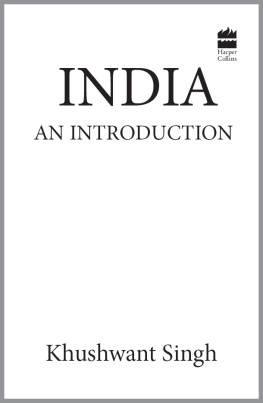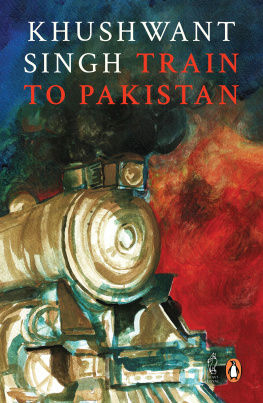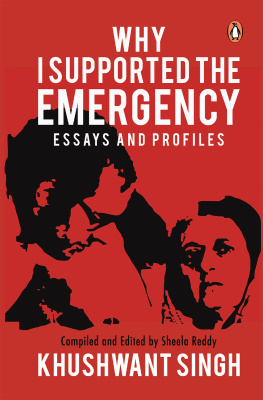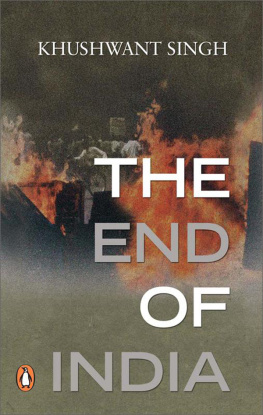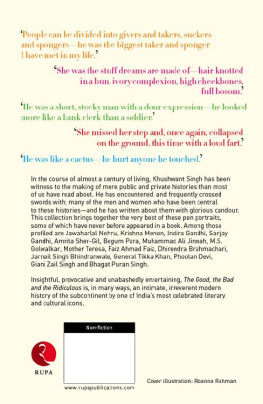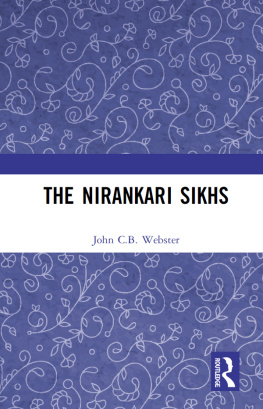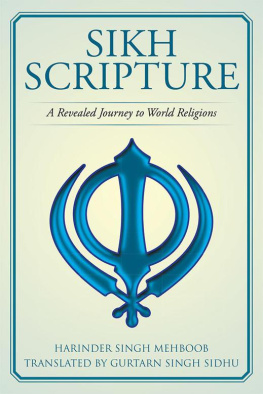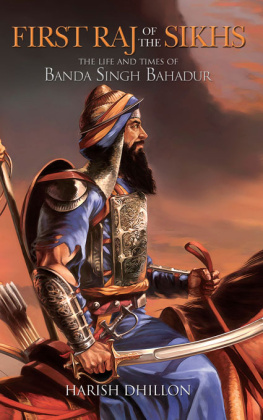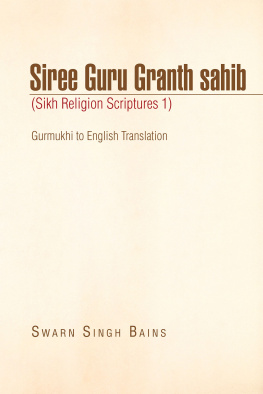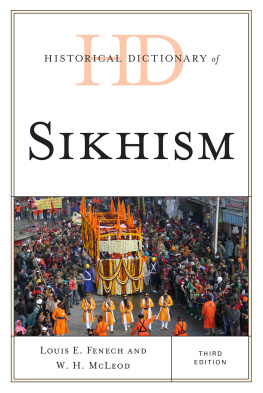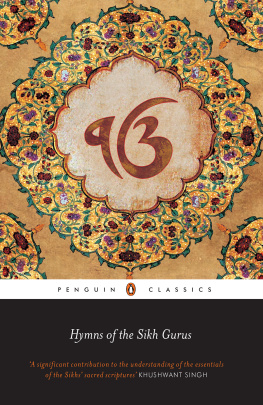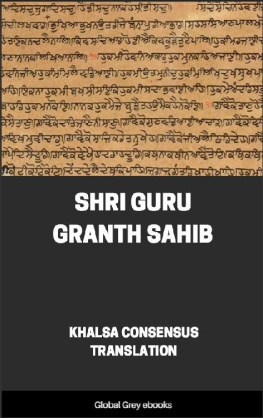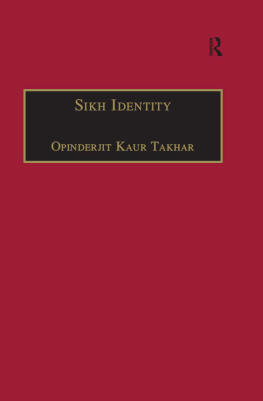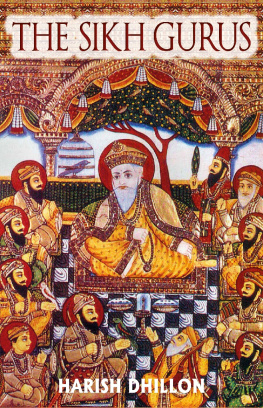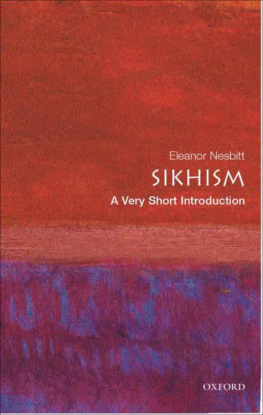THE SIKHS
Khushwant Singh

This work is respectfully dedicated to my
Father
SIRDAR BAHADUR SIR SOBHA SINGH
K.T., O.B.E.
In this compact but informative book, the author presents a concise history of the followers of one of the worlds newest religionsSikhism. Beginning with the life and times of the founder, the highly revered Guru Nanak (1469-1539), the contents move on to describe the vital contribution made by the following nine Gurus in shaping and developing the Sikh religion. The significance of the Sikh holy book, the Guru Granth Sahib, and its centrality to the religion are emphasized. The author then dwells upon important events such as the rise of the Sikh confederacy, the acquisition of a kingdom by the Sikhs and how they eventually lost it. The pivotal role of Maharaja Ranjit Singh has been highlighted.
The focus then shifts to Punjab under the British rule. The author discusses epoch-making developments such as the movements for religious reformation, the setting up of the Singh Sabha and the accompanying social reform, the decisive Akali agitation for control of various Sikh shrines and the impact of the Ghadr rebellion. The different political groups and their influence on Sikh affairs are then recounted.
Next, historically crucial episodes such as the struggle for independence from the British, the partition of India, the communal holocaust that followed and the exodus of vast multitudes are narrated in graphic detail.
The author finally rounds off the book with a description of the cultural heritage of the Sikhs and a survey of what the future could hold for this community.
Khushwant Singh is easily the most widely read author in India today. His weekly columns are reproduced by over fifty journals in all the regional languages of the country. He has done different things at different times: practised law, diplomacy and politics; taught comparative religion at Princeton and Swarthmore; and edited The Illustrated Weekly of India and The Hindustan Times. He has written regularly for several European and American journals including The New York Times. He has also edited and translated a number of literary works.
Author of eighty-nine books, Khushwant Singh is best known for his work of fiction, Train to Pakistan, and his two-volume History of the Sikhs, which is still considered the most authoritative writing on the subject. His acerbic pen, his wit and humour, and, most of all, his ability to laugh at himself, have ensured him immense popularity over the years.
He was a Member of Parliament from 1980 to 1986. Among other honours, he was awarded the Padma Bhushan in 1974 by the president of India (he returned the decoration in 1984 in protest against the Union governments siege of the Golden Temple, Amritsar).
He lives in New Delhi.
Table of Contents
W ith the annexation of the Punjab, the history of the Sikhs was merged with that of the other communities. There were, however, religious, reformist, political and revolutionary movements that were largely or wholly Sikh in character and personnel. I have taken these out of the context of historical sequence of events in the country for the purposes of this section. In doing so, I have taken the liberty of assuming knowledge of contemporary affairs both national and international. Thus, although I may make no specific reference to the rise of nationalism, the introduction of democratic institutions, the growth of separatist tendencies in certain communities, the world wars and the rise of international communism, all that is said in these chapters is to be read with these developments in the background.
deals with the history of the Sikh emigre revolutionary groups in the United States and Canada, their return home, and the formation of Marxist parties in the Punjab. Subsequent chapters give accounts of Sikh politics between the two world wars, leading up to the partition of the province and the independence of India.
T he chief reason for my writing an account of my people is the melancholy thought that contemporary with my labours are being written the last chapters of the Story of the Sikhs. It would be proper that some estimate of Sikh religion, history, traditions, and political and cultural achievements be made by someone identified with them by faith and association. It may be somewhat premature and lacking in historical perspective; it may be somewhat biased and lacking in the objective approach of the outsider. But it has the advantage of being the point of view of the believer mentally and emotionally involved in the vicissitudes of the community.
Not many books have been written on the Sikhs in the English language. Apart from passing references in travellers diaries and articles in journals, little was known of these people to the Western world till Sir John Malcolms Sketch of the Sikhs appeared in 1812. It was followed twenty-two years later by Prinseps Origin of Sikh Power in the Punjab. In 1842 a more detailed account of the Sikhs was published by MacGregor in two volumes. These and other smaller works published in between served to create an interest which was increased by the many inaccuracies apparent in their texts.
The first real work of scholarship was undertaken by Captain J.D. Cunningham, who spent eight years of his service (1838-46) in close contact with the Sikhs. In 1849 (the year of annexation of the Sikh kingdom) his History of the Sikhs was published. The first edition was proscribed. Cunningham lost his post in the Political Service and was sent back to the army. He died two years later. In 1853 a second edition appeared with an introduction by his brother stating that the author fell victim to the truth related in the book. He wrote history in advance of his time and suffered for it. The author had himself corrected the proofs of his second edition before his death. In the preface to this edition he wrote: It has been remarked by some public critics and private friends that the author leans unduly towards the Sikhs, and that an officer in the Indian Army should appear to say he sees aught unwise or objectionable in the acts of the East India Company and its delegates is at least strange. Bearing in mind the fact that Captain Cunninghams association with the Sikhs extended over the period of the Anglo-Sikh wars and the subsequent annexation of the Sikh kingdom by the British, another passage in his preface to the second edition is equally significant. The wisdom of England, he wrote, is not to be measured by the views and acts of any one of her sons, but is rather to be deduced from the characters of many. In India it is to be gathered in part from the high, but not always scrupulous, qualities which distinguished Clive, Hastings and Wellesley, who acquired and secured the Empire.
The second edition was also proscribed. Both editions contained, according to the editor of the subsequent editions, statements of an injudicious nature.
It is a pity that political considerations should have required the deliberate distortion of historical facts and rendered suspect an otherwise excellent work of objective scholarship.
The first attempt to interpret the religion of the Sikhs to the West was also a failure. In 1869 Dr Ernest Trumpp, Regius Professor of Oriental Languages at the University of Munich, was commissioned by the secretary of state for India to translate the Sikh Scripture, the Granth Sahib. He was not very successful in this mission. After two years of work, he came to the conclusion that the language of the Granth had become already obsolete to a great extent. He got very little assistance from Sikh scholars - in fact, he was sure that none existed. The Sikhs, he wrote, in consequence of their former warlike manner of life and troublous times, had lost all their learning. When Dr Trumpps translation finally appeared in 1877, it proved offensive to Sikh susceptibilities. In order to repair the damage caused to the loyal Sikhs, MA. Macauliffe was commissioned to undertake the work. Macauliffe described Trumpp work as highly inaccurate and unidiomatic whenever he saw an opportunity of defaming the Gurus, the sacred book and the religion of the Sikhs, he eagerly availed himself of it. Macauliffe admitted that the object of his work was to make reparations to the Sikhs without criticism or expression of opinion of his own.



